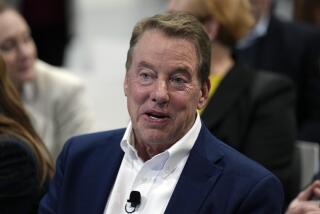Bill Ford Takes Reins of ‘Amazing Legacy’
- Share via
DEARBORN, Mich. — Bill Ford strode to the podium at Ford Motor Co.’s auditorium Tuesday to thunderous applause, an American flag at either side of the stage, with stars-and-stripes designs on the walls.
Employees, packed well beyond the room’s 470-seat capacity, gave the fresh-faced 44-year-old a raucous standing ovation.
“Gee, it’s like the Lions won a game,” Ford quipped, referring to the forlorn 0-6 record of the Detroit professional football team his family owns.
So began William Clay Ford Jr.’s tenure at the helm of the world’s second-largest auto maker, founded by his great-grandfather Henry Ford 98 years ago.
It reflected a buoyant mood that seemed to engulf workers at Ford headquarters in this Detroit suburb who have been besieged with crisis after crisis and more than a year of negative headlines.
It also marked the coming of age of Bill Ford, chairman since 1999 but only now finally in control both operationally and symbolically as he succeeds the ousted Jacques Nasser as chief executive.
The problems had reached critical mass: the concentration of power in Nasser’s hands; the continuing decline of profit, share price and market share; the sinking in quality and productivity rankings; and the endless distraction of testifying about tires, trading charges with Bridgestone/Firestone Inc. and shelling out billions for tire recalls and lawsuit settlements resulting from hundreds of fatal accidents involving Ford’s Explorer sport-utility vehicle.
As Bill Ford said Tuesday, “It was time to move on.”
Observers have wondered whether this Ford is up to the task. But his whole life seems to have been aiming for this moment. With degrees from Princeton and the Massachusetts Institute of Technology, Ford joined the company in 1979 as a product planning analyst. He held positions companywide in manufacturing, sales, marketing, finance and labor bargaining. He was elected to the company’s board when he was only 30 and named a vice president six years later.
“He’s gone through the organization; he truly loves Ford Motor Co.,” said Michael Ward, Salomon Smith Barney’s chief auto industry analyst. “He’s very loyal, and he’s very enthusiastic about Ford. Companies take on the culture of their CEOs, and I think Billy Ford is a well-respected person inside and outside of Ford. You never hear anything negative about him within the company.”
Addressing employees in an ebullient speech broadcast to company facilities around the world, Ford pledged to return the auto maker to its core business of building cars and trucks.
“We’ve been given an amazing legacy, but we’re going to leave an even greater one,” he said to more cheers. “I’m both proud and determined to lead this company forward. I love this place. I bleed Ford blue,” he said, referring to the color of the corporate logo.
He said Ford Motor must be a company for which employees want to work, that makes quality products customers want to buy, in which investors want to invest and with which dealers and suppliers want to do business.
“We need to be a company that the world looks to, to be a leader in doing things right, and doing the right thing,” he said. “To do this we want to have a laser-like focus. We need to concentrate our resources on our core business--designing and building the best cars and trucks in the world--and that will never change.”
That seemed an apparent rebuke of Nasser’s attempt to remake the company into a leading consumer and e-commerce company. The young new leader said that “Ford Motor Co. is not and never has been about one person; it’s about all of us.” But he reserved kind words for Nasser, a 33-year company veteran, saying he “made many contributions to Ford in every corner of the world.”
To some extent, Nasser was in the wrong place at the wrong time, in charge when the auto maker was slammed by the Firestone tire recall, because virtually all of the 6.5 million tires recalled in August 2000 were on Ford products.
But Nasser’s sometimes combative style, eagerness to concentrate decision-making to himself (he had 16 vice presidents reporting directly to him) and full-court press “chasing strategies,” as Ford put it Tuesday, alienated the board as well as the chairman, whose name, after all, is on the building.
“I think there are a lot of people that respected Jacques Nasser,” analyst Ward said. “But as the CEO you have to accept the bad with the good, so he’s obviously taken some of the responsibility for things that have gone wrong at Ford.”
One employee who works in finance agreed: “I think Jacques brought a lot of changes we need,” said the worker, who did not want to give his name. “Probably too much too fast, but I hope we don’t abandon all of them,” he said, citing diversity and performance evaluation programs.
Bill Ford was widely praised by Wall Street, though investors sent Ford’s stock down 16 cents to close at $16.05 a share on the New York Stock Exchange.
“He’s surrounded himself by a couple of very solid people. The new vice chairman is extremely experienced and versed in dealing with the Street and focusing on cost-cutting and balance-sheet issues,” said Michael Bruynesteyn, senior auto analyst at Prudential Securities in New York.
Ford board member Carl Reichardt, 70, a former head of Wells Fargo, is the new vice chairman. Nick Scheele, 57, was promoted from head of North American operations to chief operating officer.
“Nick Scheele seems to be on quite a roll within Ford Motor Co., and he’s going to run the auto business, so I think Bill recognizes that his own management experience is limited and he’s drawing on other people,” Bruynesteyn said.
Scheele will be a good chief operating officer, said James O’Connor, president of the company’s Ford Division, who was attending a trade show in Las Vegas.
“When Nick went back to Jaguar ... he got out the Ford manuals and said, ‘Let’s get back to the fundamentals,”’ O’Connor said. “We have great processes at Ford--we just need to execute them--and that’s what Nick will do.”
To be sure, Bill Ford has his doubters. He was criticized for not stepping in during the Firestone fiasco, with observers suggesting he wanted to avoid getting entangled in an issue that could tarnish his reputation. He was questioned for having Nasser appear in national TV ads touting Ford’s commitment to customers and safety, instead of making himself the face and voice of the company.
Still, his easygoing personality and oft-stated devotion to the company has in general won over employees. His support of ecological issues including less-polluting SUVs has won support among environmentalists.
A great-grandson of both Henry Ford and Harvey Firestone, he expressed anguish at a news conference in May over the bitter feud between the auto and tire makers.
And despite his central role, he says he doesn’t want to dominate the spotlight.
“For many, many years, probably all the way back to Henry Ford the 1st
“Ford needs to convince investors of two things: First, that he has the determination to undertake the tough steps needed to improve the company,” Morgan Stanley auto industry analyst Steve Girsky wrote in a research report Tuesday. “Second, that he will look out for the interests of all shareholders, not just the Ford family.”
The Ford family owns about 4% of the company’s 1.8 billion common shares but has 40% of voting rights by virtue of preferred stock ownership, giving them the final word in business decisions.
But with mounting losses forcing the company this month to cut its dividend, an important source of income for the family, for the first time since 1991, having Bill Ford incontestably in the driver’s seat could bring a sense of steadiness.
On Monday, the time came for Bill Ford to exercise that stabilizing leadership.
“Jacques and I sat down late yesterday afternoon and both decided that this was the time and the right thing to do,” Ford said when asked how the decision was reached with Nasser.
At 8:30 a.m. Tuesday, Ford’s board met to approve Nasser’s departure and Ford’s ascension to the ultimate role he will play for his firm and for his family.
*
Times staff writer John O’Dell in Las Vegas contributed to this report.






